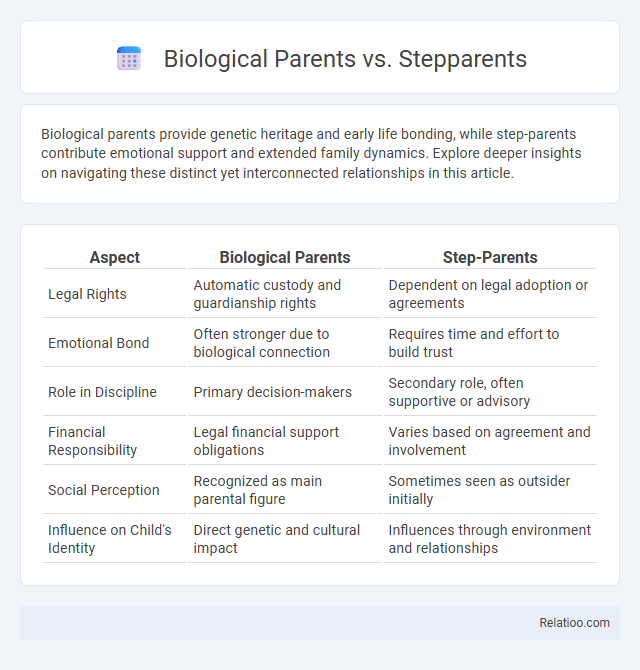Biological parents provide genetic heritage and early life bonding, while step-parents contribute emotional support and extended family dynamics. Explore deeper insights on navigating these distinct yet interconnected relationships in this article.
Table of Comparison
| Aspect | Biological Parents | Step-Parents |
|---|---|---|
| Legal Rights | Automatic custody and guardianship rights | Dependent on legal adoption or agreements |
| Emotional Bond | Often stronger due to biological connection | Requires time and effort to build trust |
| Role in Discipline | Primary decision-makers | Secondary role, often supportive or advisory |
| Financial Responsibility | Legal financial support obligations | Varies based on agreement and involvement |
| Social Perception | Recognized as main parental figure | Sometimes seen as outsider initially |
| Influence on Child's Identity | Direct genetic and cultural impact | Influences through environment and relationships |
Understanding Biological and Step-Parent Roles
Biological parents provide genetic heritage and early emotional bonding that shape a child's identity, while step-parents often contribute crucial support and nurture in blended family dynamics. Understanding the distinct roles involves recognizing biological parents' foundational influence and the effective nurturing relationship step-parents build through trust and consistent caregiving. Family value emphasizes respect and collaboration among all parental figures to create a stable, loving environment for the child's development.
Parental Rights: Biological vs Step-Parents
Biological parents possess inherent parental rights established by genetics and legal recognition, often prioritized in custody and decision-making matters. Step-parents may acquire limited parental rights through adoption or court agreements but typically lack automatic legal authority without formal processes. Family values emphasize nurturing and stability, where legal frameworks balance biological ties with the emotional bonds fostered by step-parents to protect children's best interests.
Emotional Bonds and Attachment Differences
Emotional bonds with biological parents often form through early, consistent caregiving, creating a foundational attachment critical for Your sense of security and identity. Step-parents may develop strong, meaningful attachments over time through trust-building, shared experiences, and emotional support, though these bonds can differ in depth and duration compared to biological ties. Family value emphasizes emotional connection, trust, and mutual respect, recognizing that meaningful relationships can transcend biological links while fostering a supportive environment for emotional growth.
Legal Responsibilities and Custody Issues
Biological parents hold primary legal responsibilities and rights regarding custody and decision-making for their children, including providing support, education, and healthcare access. Step-parents may gain limited or conditional legal responsibilities, often requiring formal adoption or court agreements to establish custody or guardianship rights. Your understanding of family value includes recognizing the distinct roles and legal protections each parent type holds within custody disputes and child welfare considerations.
Navigating Discipline: Approaches and Challenges
Biological parents often use established family norms and emotional bonds to enforce discipline, while step-parents may face challenges in gaining authority and building trust within the family dynamic. Effective navigation requires consistent communication, respect for existing family values, and adaptability to the emotional needs of children during transitions. Balancing these approaches promotes harmony and reinforces a unified family structure despite differing parental roles.
Family Dynamics and Blended Households
Biological parents often establish the foundational family dynamics through genetic ties and early emotional bonds, while step-parents contribute by navigating complex relationships and fostering trust within blended households. Your ability to balance roles and communicate openly can strengthen family cohesion, allowing for a supportive environment that respects both biological connections and new parental relationships. Family value in blended households hinges on mutual respect, adaptability, and shared responsibilities, creating a unified family identity despite diverse origins.
Communication Strategies for Cohesive Parenting
Effective communication strategies are essential for cohesive parenting in families with biological parents and step-parents, fostering trust and mutual respect. Structured family meetings and open dialogues encourage sharing expectations and addressing conflicts, strengthening family bonds. Prioritizing consistent messaging and active listening across parental figures supports children's emotional stability and promotes harmonious family values.
Impact on Children’s Identity and Wellbeing
Biological parents provide genetic ties and a foundational sense of heritage that deeply influence children's identity formation and emotional security. Step-parents contribute to family dynamics by offering additional support, stability, and love, which can enhance your child's wellbeing if relationships are nurtured with trust and respect. Family values, when consistently communicated and practiced, create a cohesive environment that promotes resilience, belonging, and positive development in children.
Conflict Resolution Between Parents
Biological parents and step-parents often face unique challenges in establishing authority and trust within blended families, requiring effective conflict resolution strategies to maintain harmony. Your ability to facilitate open communication and mutual respect plays a critical role in mitigating disputes, fostering a stable environment for children. Prioritizing family values such as collaboration, empathy, and compromise strengthens relationships and supports the emotional well-being of all members.
Building Trust and Long-term Relationships
Building trust between biological parents, step-parents, and children hinges on consistent communication, respect, and empathy, fostering a secure environment that nurtures emotional bonds. Long-term relationships thrive when all family members honor each other's roles and experiences, creating a united support system despite differing backgrounds. Prioritizing shared values and mutual understanding strengthens family resilience, ensuring meaningful connections beyond biological ties.

Infographic: Biological Parents vs Step-Parents
 relatioo.com
relatioo.com